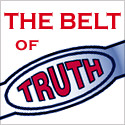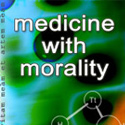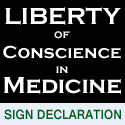The Brave New World – What Must We Do?
I quote from Charles Colson addressing US Congress in May 2001 describing a scene from Aldous Huxley’s 1931 Brave New World:
…a grey building in London and in one of the laboratories deep inside, there is a conveyer belt moving from one side of the room to the other. On that conveyer belt are little glass jars, and in those glass jars are fertilized ova, and they are clattering back and forth on the conveyer belt as they go from one side of the room to the other. Those fertilized ova will break into 96 separate buds, and each of those buds will mature into an embryo, and each one of those embryos will mature into a human being.
Interestingly enough, the people who are conducting this experiment have figured out how to pre-program genetically what each person who will be created in that test tube will be. Some will be labourers, some will be congressman, some will be business leaders.
Fanciful? It certainly seemed to be in 1931. Now? Let me tell you that in December 2003 the New Jersey state assembly by a 41-31 vote passed a bill that was signed into law in January 2004 allowing the cloning and implantation of human embryos, as long as the unborn child is killed sometime before term for research or organ transplantation. Cloning for reproductive purposes is prohibited and is punishable by a 20 yr gaol sentence. So, if the baby is killed, that’s legal; if the baby is allowed to live, that’s illegal. The bill’s sponsor said: “Do this for your children and your grandchildren.”
And you know about the couples here in Western Australia trying to create a “designer baby” in the hope that the child eventually will save the life of their critically ill daughter, all other avenues of receiving a tissue match for a marrow transplant having failed. Some embryos are deemed unsuitable and therefore not selected. One embryo is selected but fails to survive.
And, as from April 2004, five licences have been issued in Australia for IVF and stem cell research in embryos.
Does it matter? Peter Singer, the world’s most well-known ethicist, would argue that it is OK to sacrifice a newborn baby up to 4-6 weeks before it becomes self-aware – so that would make the killing of a cloned baby for its organs acceptable. I think we instinctively react in horror to that scenario but is it OK for a greater good e.g. to save the life of another person? And if we say that it is not OK, then why, and at what stage and in what circumstances do we say that life matters? As in the ‘designer baby’ instance, does it matter that small clumps of human cells are going to be discarded? When does human life begin and when does it have value? What does it mean to be human?
When does human life begin? Even Jeremy from Zits knows that. You remember that wonderful cartoon when he is playing Stairway to Heaven on his guitar and his mother comments that he was conceived to that tune? His guitar strings all snap as he struggles to grasp the significance of this gratuitous comment.
And the ‘designer child’ knows: “Mummy, what would have happened to me if my tissue match had not been right?” But you were just a clump of cells, dear. “But Mummy it was still me, my hair colour was determined and my eye colour was determined.” But you weren’t really a ‘person’ then, dear.“Mummy, even the shape of my smile was determined – that was me!”
The process of embryo selection results in destruction of unsuitable embryos and the ‘designer child’ could have been one of these. Though not yet expressed, individuality is inherent and real in the genetic programming from the time of fertilisation!
Biologically human life begins when cells possessing the ability to replicate and differentiate have human chromosomes. They are uniquely and unequivocally human with individual chromosomal patterns that determine unique adult characteristics.
We may argue when life has ‘value’ but we may not argue when it begins.
And once we get into the question of when life becomes of value and when is that value lost, then we have lost the battle of what it means to be human. Can we define human life by its potential? Can we define it by the degree of disability? Also before us in this state is the question of whether to allow embryo selection to eliminate certain hereditary problems that can be detected at the embryo stage. What diseases and problems will we select and how far do we go in deciding what is a disability? Will deafness be regarded as a disability in terms of whether a life is of value? There are those who wish to select their children on this basis and those who have impairment of hearing in our world are outraged about this.
Concepts of value and worth and disability and personhood and self-awareness are too arbitrary and subject to the opinions and whims of the day to base decisions regarding life and death. Nations may decide that certain states of mental and physical capacity determine that individual’s right to exist or not exist, and then it may be re-defined to include or exclude varying physical characteristics that are deemed acceptable or of worth to society. That should sound terrifyingly familiar.
So many arguments and rationalisations for embryo selection can be made in the name of compassion that sound good but however much we like to think that compassion is ‘enough’ in these matters we still have to consider the implications openly and freely without this being labelled as condemnation or lack of compassion – such accusations stifle proper consideration and proper debate.
The real question we have to grapple with is when does human life become of intrinsic value? Our position is that it has intrinsic value from the time of fertilisation and it continues until life ends naturally. We must all know this deep inside us and can echo with the designer child: “Mummy, I know you love me and would do anything for me and I thank you for that, but I also know you would have eliminated me if my tissue match had not been ‘right’ in your eyes. Does that mean that I was not of value for who I really was and now am?”
Consider further implications. Can a designer child also be created for the ‘cure’ of adult diabetes and if so, up to what age? May a 50-year-old male father a baby for this purpose? Up to what age and for what purposes may designer children be created and who will make such decisions? Should it only be left to the individual to make these decisions? Are there not implications for society?
Are there not also implications in embryo selection for disease and disability? Do we allow selection to eliminate diabetes or high cholesterols from our world? It sounds attractive, doesn’t it? Do we eliminate congenital deafness and what does even asking that question say about how we view the deaf in society? Can we have a perfect world? If the answer is ‘yes’ then surely we should also consider characteristics such as athletic ability – at least because we will have a healthier society with less consequent cost to our health system. Will longevity be a selection criterion? And if so will it be because we consider that living longer is an advantage to society or will we consider it undesirable because of an increased cost to society in terms of caring for our aged? Or will we select a desirable age to live to and if so what age and what will we do with those who are threatening to live longer than that age?
Even with good intentions the end-of-slope consequences are frightening. But once we push the boundaries evil intentions also become easier to implement. There are lines that must properly be drawn and we must draw them now.
It is conceivable that New Jersey has done us a favour in passing what many of us would still have thought impossible and helping to prove the seriousness of the warnings given. There is good reason to believe that what we are facing in the attempted manipulation of life and death is more sinister than any other evil we have encountered.
And if this is any where near the truth, what must we do?
We can all pray asking that God will give us wisdom in these things and bless our country.
Yes – we must preach the gospel in season and out of season. We must bring people into the Kingdom to adopt Kingdom values – through personal evangelism and all the programs and activities that we do and must continue to do.
But we also need to speak to issues involving our culture, and to say what needs to be said as God’s people and watchmen (Ezek 33:7-9). We need to appeal to lasting values of virtue and honour, justice and mercy that are a part of universal and natural law. We need to proclaim the Word of God – as Jeremiah had to – to the rulers and people of this land.
This is what the LORD says: “Go down to the palace of the king of Judah and proclaim this message there: ‘Hear the word of the LORD, O king of Judah, you who sit on David’s throne–you, your officials and your people who come through these gates. This is what the LORD says: Do what is just and right. Rescue from the hand of his oppressor the one who has been robbed. Do no wrong or violence to the alien, the fatherless or the widow, and do not shed innocent blood in this place.'” Jeremiah 22:1-3.
We should and can argue for a Christian Worldview, using and affirming the principles of (God’s) Natural Law and beyond that to argue on the grounds of the logical progression of the humanistic argument into the inevitable ‘slippery slope’ consequences. We cannot afford to ever define life in terms of self-awareness, personhood or usefulness. The end-of-the-slope consequences are terrifying. We must always argue that human life has intrinsic value, that we are more than animals, and that there is a line that must not be crossed.
To many, that we are more than animals is self-evident truth but there will always be those who deny this. To Christians and those sympathetic to our Christian heritage we can remind them that God created man in his own image (Gen 1:27), that it is the spirit in a man, the breath of the Almighty, that gives him understanding (Job 32:8), and the spirit returns to God who gave it (Eccl 12:6,7).
We need to reach our young with values education and accurate information about these matters.
We can support and join organizations that seek to inform people in strategic positions e.g. politicians via the Australian Christian Lobby. And where appropriate we need to challenge and confront and encourage e.g. by letter writing to the media and politicians.
And there will be some of us that will actually have to stand for parliament. And what will it be that finally makes us do this?
Being a medical practitioner in a group of Christian GPs for 35 years has been my privilege and passion and fulfilment and enjoyment. Continuing this for another decade or so, by the grace of God, has been my dream. And now this has all been turned upside down. Allow me to tell you why.
It was almost 2 years ago that I was concerned at the lack of a unified Australian Christian medical response re stem cell research in embryos and realised that I needed to do something myself. In 1998 I had the privilege of coordinating a response on behalf of Christian leaders in WA to the abortion legislation and I was able to do the same for this issue to both State and Federal MPs and the Prime Minister.
The question kept nagging at me – what else needs to be done?
I realised that it was extremely difficult to get Christians to be reallyopposed to something like euthanasia and embryo research and selection for compassionate reasons. I also considered that in addition to people being asleep that those that those who were awake felt powerless to influence what was happening in any meaningful way and therefore would remain silent. I began to see that a senate campaign could be one way of doing this and perhaps recruiting prominent Christians to be prepared to nominate. The very vague thoughts that I might be involved in such a campaign would not go away and it became a growing conviction as from November 2003 that the trap was being shut on me. Although it was hard to imagine giving up medicine it seemed that the potential in treading the Senate ‘pathway’ was huge in both waking the church and giving it a voice in the public square.
And so I now find myself running for Senate with a theme of Choose Life Australia – upholding the dignity and intrinsic value of human life from fertilisation to its natural end. I believe this to be as fundamental as the introductory articles of the Universal Declaration of Human Rights:
All human beings are born free and equal in dignity and rights…
everyone has the right to life, liberty and security of person.
It is not a single-issue campaign. So much can flow from this position once we establish it, like how we look after the less privileged in society; like our attitude to refugees; like how we approach problems in our community such as compulsive gambling or other health issues. We also want to preserve the fundamental values of our society that we believe important for the future of our society and we want to be able to say so without fear of denigration just because we hold these values dear. We include in this the fundamental institutions of marriage and family.
So much has happened in the last two years. The time for concerted and cooperative action is now. The political urgency is now. Already we have missed vital opportunities for a strong Christian voice and we find ourselves being reactive instead of proactive in issues that shape our world and society. By the time we have another federal election we may have lost irretrievable ground.
Now is the time!
Now is the time for Australia to Choose Life
Now is the time for specific Christian voices at all levels of community
Now is the time to uphold a Christian worldview to our culture
Now is the time to defend what it means to be human.
Lachlan Dunjey. April 2004.






